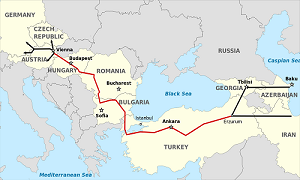Russian Gas in the Southern Gas Corridor Could Undermine the EU’s Diversification Plans
By Ilgar Gurbanov
March 27, 2017, the CACI Analyst
Gazprom has officially declared its willingness to use the Trans-Adriatic Pipeline (TAP) as a route to deliver gas to Europe. TAP is an integral part of the Southern Gas Corridor (SGC) which is one of the priority energy projects for the EU to ensure the continent’s security of supply from a non-Russian source. Although technical and legal possibilities exist for Gazprom’s use of TAP’s expanded capacity, the long-term contracts securing the pipeline’s initial capacity for Azerbaijani gas together with EU legislation makes this option less likely. Nevertheless, the possibility of a Russian bid for TAP could hamper the EU’s diversification plans and block future gas supplies from other non-Shah-Deniz sources.

Turkmenistan advances westward natural gas export
By Natalia Konarzewska
March 25th, 2016, The CACI Analyst
In late December 2015, Turkmenistan officially announced the completion of the East-West gas pipeline. This 773 kilometer route with an annual capacity of 30 billion cubic meters (bcm) will connect natural gas from fields located in eastern Turkmenistan to those along its Caspian Sea coast, with the potential of further transfer via the Caspian Sea and onward to the Turkish and European markets. The construction of the pipeline is complementary to Turkmenistan’s current strategy for gas exports. Ashgabat seeks broader export opportunities in Turkey and Europe to reduce its dependence on Russia and China as major gas export outlets. However, despite positive political shifts, which might enhance Turkmenistan’s energy cooperation with Turkey, Azerbaijan and the EU, several obstacles remain to the westward transfer of Turkmenistan’s gas.
Azerbaijan in search of new economic model
By Fariz Ismailzade
March 11th, 2016, The CACI Analyst
After a decade of transformational economic growth, reduced oil prices forced Azerbaijan to a double devaluation of its national currency, significant reduction of public spending, slowdown of GDP, and most importantly, panic in the domestic market among both the general population and the business community. The government responded with several anti-crisis programs and measures, aimed at stimulating national economy, supporting local production and easing the business climate for the local entrepreneurs. President Ilham Aliyev has called 2016 “a year of deep economic reforms.” It remains to be seen whether the country will be able to shift gears and transform its economy to achieve sustainable growth from non-oil sectors.
Georgia's energy sector: debacle avoided, but Tbilisi needs to move beyond short-term solutions
By Mamuka Tsereteli
March 10th, 2016, The CACI Analyst
On March 4, 2016, Georgia and Azerbaijan reached a deal that allows Georgia to receive close to 500 million cubic meters (mcm) of additional gas annually from Azerbaijan. Georgia’s Minister of Energy Kakha Kaladze announced after the signing that Georgia will no longer need to buy additional volumes of gas from Gazprom. This ends several months of speculation about Georgia’s concessions to Gazprom, fueled by a number of controversial statements by government officials. This agreement strengthens the strategic partnership between Azerbaijan and Georgia, and keeps Georgia from becoming further affected by Gazprom’s coercive power.
Despite Georgia-Azerbaijan gas deal, distrust is sown
By Boris Ajeganov
March 7th, 2016, The CACI Analyst
Uncertainty on the future of Georgia’s energy security has been growing since late 2015, when Georgia’s minister of energy and deputy PM Kakha Kaladze met with Alexey Miller, CEO of Russia’s Gazprom twice in the span of a month. Discussions on Gazprom’s potential return to the Georgian market quickly raised eyebrows in Baku and caused popular protests in Tbilisi. In a March 4 turnaround, Kaladze announced a deal to receive additional gas from Azerbaijan, thus removing the need to import Russian gas. Party politics aside, Tbilisi appears to have skillfully used its strategic position in the South Caucasus to secure a favorable energy deal without sacrificing its sovereignty.







